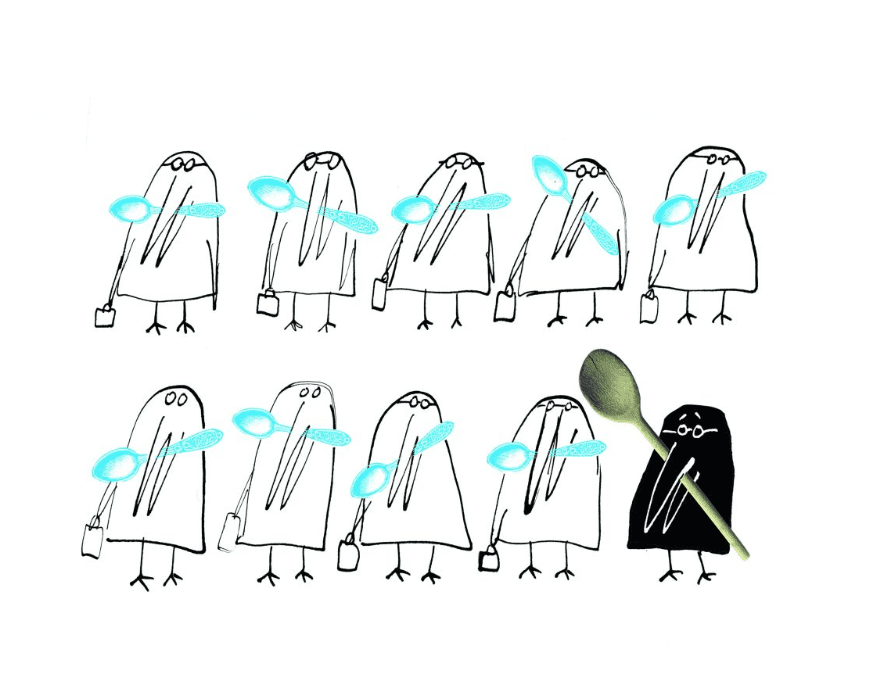10 questions about… Equal Opportunity

1. Why be concerned about equal opportunity?
François Dubet, sociologist, former director of studies at the École des hautes études en sciences sociales, EHESS (School for Advanced Studies in Social Sciences).
Equal opportunity is aimed at producing “fair” inequalities based on merit, through a competition regarded as impartial. If some obtain wealth and power while others have nothing, then the competition in place can only be a Darwinian rivalry that serves to generate and legitimize the most significant social inequalities. To be concerned about equal opportunity means, therefore, to be most concerned about what happens to the losers. The focus, however, is most often on the elite.
We’re pleased when prestigious educational institutions welcome a few hundreds more students from modest backgrounds, but this doesn’t change anything for the vast majority of disadvantaged students, who are systematically oriented towards less prestigious training programs that will garner them fewer financial rewards.
This is why we need to support equality of school learning. And, we need to develop a new concept of merit, which is all too often limited to scholastic success, with too much emphasis placed on a diploma rather than on professional value or commitment to others. Equal opportunity isn’t fair when it applies only to scholastic opportunities, and it should also involve principles of justice and social equality.
2. What are the philosophical bases for this concept?

Alain Anquetil (H.84), philosopher, with a doctorate in cognitive sciences from the Ecole Normale Supérieur, and currently professor of moral and ethical business philosophy at ESSCA.
The idea of equal opportunity seems to be linked to the belief that in a democratic society with a free-market economy, social advancement should be possible for everyone. “Those with similar abilities and skills should have similar life chances,”[1] wrote the American philosopher John Rawls (1921-2002).
But how can this belief be justified morally? Should we refer to maximizing the general good, which equal opportunity could help to ensure? In this case, equal opportunity would have only an instrumental value rather than a moral value in itself. It would achieve moral value if it were seen as constituting the inviolable dignity of humankind, or as an exemplary manifestation of democratic and liberal principles (which is often the case). As John Rawls believed, the right to fair and equal opportunity derives from the fact that each person is a moral subject, with a sense of justice and an ability to conceive of a rational life plan.
- A Theory of Justice, J. Rawls, Harvard
University Press, 1971, trad. fr. C. Audard, Théorie
de la justice, Paris, Seuil, 1997.
3. Which countries have made the most progress in achieving equal opportunity in schools?
Arnaud Dubief (H.16), co-founder of Toi Aussi! (You Too!), an association that supports access to preparatory classes and prestigious educational institutions for secondary students from rural areas.
Finland! This country has made learning about mathematics an essential lever for social advancement, and I believe this is a good thing. In fact, to promote equality in math education from a very early age means to promote equal opportunity. Finnish students begin to study math in pre-school and follow a program that emphasizes problem-solving, development of cognitive capacities, and experience, beyond the usual, obvious requirements. They are encouraged, more than French students are, to think for themselves, from pre-school through secondary school. For example, they are helped to learn how to count for themselves instead of being required to memorize multiplication tables.
They are also given less homework, since it is known that success in doing homework depends significantly on parental help, which tends to perpetuate social and professional inequalities. Rather than adding more hours spent in class, I believe we should adapt our teaching methods. France should also consider the example of Germany concerning adult learning. Across the Rhine, a person can, more easily than in France, opt to be trained to do something else after beginning a first career. Equal opportunity also means providing an opportunity for a second chance and bridges to new things, rather than basing everything on results on the baccalaureate exam and in preparatory classes.
4. The United States and the model of the “Self-Made Man”: is this still relevant?

Serge Bloch
Dominique Mijelle (H.91), graduate of HEC and Stanford University and a resident of the United States for 25 years.
In the United States, the notion of social mobility is still very present in the collective imagination: people still believe that if a person works hard, he or she will achieve success. However, the income gap is getting bigger and bigger. As the World Inequality Report notes, “The income-inequality trajectory observed in the United States is largely due to massive educational inequalities, combined with a tax system that grew less progressive […]”[1]. In reality, the American dream vanished in the 1980s. Most Americans born in 1940 have had more prosperous lives than their parents had, while only half of those born in 1980 earn more than their parents.[2] The exorbitant costs of higher education and crippling student debt are among the factors often cited.[3] Democrats demand free universities, while more and more Americans question the value and return on investment of their diplomas.
There is still denial, though, concerning how much one’s socio-cultural background determines one’s success. Americans continue to see innovation and entrepreneurship as keys to social advancement, but in fact the 1% richest among the population have 10 times more chances to become inventors than do those from lower- and middle-income backgrounds.[1]
- 1. https://wir2018.wid.world
- 2. The Lost Einsteins, de Raj Chetty.
- 3. “ At This Rate, It Will Take 100 Years to Pay Off America’s Student Debt ”, article paru sur le site Bloomberg.com en août 2019.
- 4.http://www.equality-of-opportunity.org/assets/documents/inventors_paper.pdf
5. What impact do scholarships have on a person’s individual experience?
Emmanuelle Ferresi (H. 18), consultant and member of the association Fleur de Bitume.
All my education was financed by a scholarship from Fondation 104, established by Valérie Colloredo and operating within the HEC Foundation. I was incredibly lucky to obtain this support, which was based on social criteria and merit (ranking on the entrance exam). But this scholarship didn’t give me entirely equal opportunities. Attending the HEC integration weekend, for example, was too expensive for me, and I was not able to study abroad. When I entered HEC, I asked myself what young people did for fun there. I was the only person from my preparatory class, which hadn’t sent anyone to HEC in 10 years, while students from the big preparatory classes in the Paris region were already part of groups of friends. On the other hand, my education in Jouy-en-Josas was extraordinary in every way.
This scholarship is a wonderful force for integration, when coupled with other tools. For example, Fleur de Bitume (Flower on the Asphalt), a student association sponsored by Cordées de la Réussite (Ropes to Success), welcomes young high-priority students to the HEC campus to talk with them about history, art, current events…discussions that not all of them have with their parents. We also need an educational system that is more transparent. I learned about HEC by chance, during an orientation session. While more affluent families already have strategies in place for their children (a choice of options, preparatory classes, etc.), my parents, a pastry-maker and a saleswoman, barely understood the difference between a baccalaureate in sciences and a baccalaureate in economics and sociology. To achieve real equal opportunity, we need to begin working toward it as early as possible, in primary school!
6. What actions is the French government planning to increase opportunities for entering prestigious educational institutions?

Ministry of Higher Education and Research.
This issue is being studied with the participation of leading institutions. The administrators of these establishments have been asked to make recommendations for ways to significantly increase enrollment by students from lower-income social groups[1]. The head of Ecole Normale Supérieure, the president of Polytechnique, and the heads of three Paris-based business schools (HEC, Essec and ESCP Europe) have all agreed to contribute to this effort, under the guidance of the Chamber of Commerce.
We must consider creating new ways to enroll in these institutions that will privilege a greater diversity of talents and skills, acquired through preparatory classes operated in part or fully by the institutions, to ensure that all candidates have the necessary academic qualifications. Following the example of the dedicated CPES program to prepare students to enter Paris University of Science and Letters (PSL), developing classes to prepare students for specific programs is a possibility to be considered. The report, set to be completed in September, will rapidly be followed by the first concrete initiatives.
- Scholarship students account for around 30% of the total student body in more than half of these institutions. Almost a quarter (23.8%) of students in engineering schools are on scholarships, while around 14% of students in business schools are on scholarships.
7. The announcement that Sciences Po Paris would no longer require a written entrance exam provoked a lot of discussion. What impact will this change have on ensuring equal opportunity?
Frédéric Mion, head of IEP Paris.
The written exam hasn’t been eliminated. It remains at the heart of our admission procedures and training; we are a university based on writing, reflexivity, creativity, and rigorous thinking. Candidates must now succeed on numerous written tests: the baccalaureate exam, written work throughout high school, personal expression in the “personal profile” each student’s file must include, and an essay.
The written exam we formerly required proved to limit equal opportunity; around half of the students who took it failed. In addition, this written exam only confirmed students’ baccalaureate results (97% of our current students achieved “good” or “very good” results on their baccalaureate). The point of eliminating this written exam is also to eliminate some of the negative factors in exams of this type: a rush to prepare students to take it, which often proves too difficult and costly for families. The new admissions criteria have been designed to give every type of student a chance to succeed. They allow for emphasizing the advantages and progression of each kind of talent and focusing on what each student does best.
By choosing complementary criteria and placing some emphasis (although not all the emphasis) on the oral exam, the new admissions procedure gives opportunities to all kinds of excellence. Keep in mind that eliminating the written exam to begin a master’s program, which had already taken place, proved to get rid of a lot of barriers and self-censure among candidates and to encourage more people (an increase of 50%) to apply for the program.
8. Is HEC doing enough about this issue?

Serge Bloch
Éloïc Peyrache, assistant director of programs, HEC.
Equal opportunity is at the heart of HEC’s social footprint. First of all, we have an extensive financial-aid program for students with CROUS scholarships, which can cover all a student’s educational expenses. For the past 10 years, the HEC entrance exam has been free for CROUS scholarship students. In addition, through an agreement with Bred, we offer no-interest loans, with no deposits or guarantees, to any student supported by a scholarship from the HEC Foundation.
As a result of the Grande Ecole program, 15% of eligible students are receiving state scholarships (around 35% of level 0 students and 8% of level 7), compared to 5% 10 years ago. We have set the goal of raising this total to 25% over the next five years, which basically corresponds to the number of scholarship students taking the entrance exam. We have awarded 261 scholarships this year (up to 800 euros) to scholarship students from preparatory classes, and we support 400 scholarship students per year in Prep’HEC.[1]
With Fleur de Bitume, we are active in high schools in high-priority neighborhoods, with the goal that all the students we work with will achieve a passing grade with “distinction” on their baccalaureate exam (compared to 55% today). This project involves cultural encounters with HEC students, tutoring, the national eloquence competition Eloquentia@HEC, orientation support… We have also launched Stand Up, aimed at female entrepreneurs. HEC spends around 4 million euros per year on these various initiatives, most of which is provided by the HEC Foundation.
- 1. See the following question.
9. Can you describe Prep’HEC, launched in 2007?
Hélène Bermond, equal opportunity delegate, HEC Paris.
We work with students enrolled in economic and business preparatory classes to help them maximize their chances to enter a prestigious educational institution. The pre-entry seminar at the beginning of the program is a powerful first step. It brings together, for a week at the end of August, 150 bachelors-degree students on the HEC campus.
The program’s multidisciplinary approach, which includes everything from tutoring in math to classes in theatre improvisation and debates in English, helps students focus on potential successes and to overcome any psychological barriers.
In fact, these young people lack neither talent nor drive, but rather confidence in themselves. We bring them together with students who have achieved their diplomas, who help demystify the entrance exam and life in a preparatory program. This encourages them to aim high and climb their personal Everest. After the seminar, students in Paris-area high schools [1] take part in classroom-based courses: student tutorials, coaching, professional sponsorship, language classes, etc. The others (82 this year, from 45 different preparatory classes, including in Martinique and Guadeloupe) participate in distance-learning programs, each student working with a particular HEC student. At the end of Prep’HEC, 85% of participants enter a prestigious business school, and 10% enter one of the top six schools. Like any student enrolled in the HEC preparatory program, these students can apply for an “HEC for everyone” scholarship (up to 800 euros; 261 awarded in 2019).
[1] Lycées Jules-Michelet, Vanves (92) CPGE ECT, Henri-Moissan, Meaux (77) CPGE ECT, Olympe-de-Gouges, Noisy-le-Sec (93) CPGE ECE.
10. What other national programs are helping students from disadvantaged backgrounds enter prestigious educational institutions?

Franck Fournol (H.72), president of HEC Volunteers.
The most useful initiatives to facilitate access to higher education are mainly those involving individual support, like the Cordées de la réussite program. Students from a prestigious school or a top-of-the-line university or preparatory class thus become tutors for students in middle schools, high schools and preparatory classes who come from disadvantaged neighborhoods.
These tutors of course provide academic support, but they also offer other kinds of support (training in behavior, sponsoring, practice interviews) to break barriers that may cause some students to believe that higher education is not for them. Beyond these efforts by volunteers, certain regulations help to bring about progress. For example, in order for their training programs to be recognized by the government, private establishments are now required to adopt policies that encourage all types of students to enroll, no matter what the students’ backgrounds may be. And, beginning this year, through Parcoursup, certain state training programs are required to admit at least a minimum percentage of scholarship students.
Published by Cyrielle Chazal

